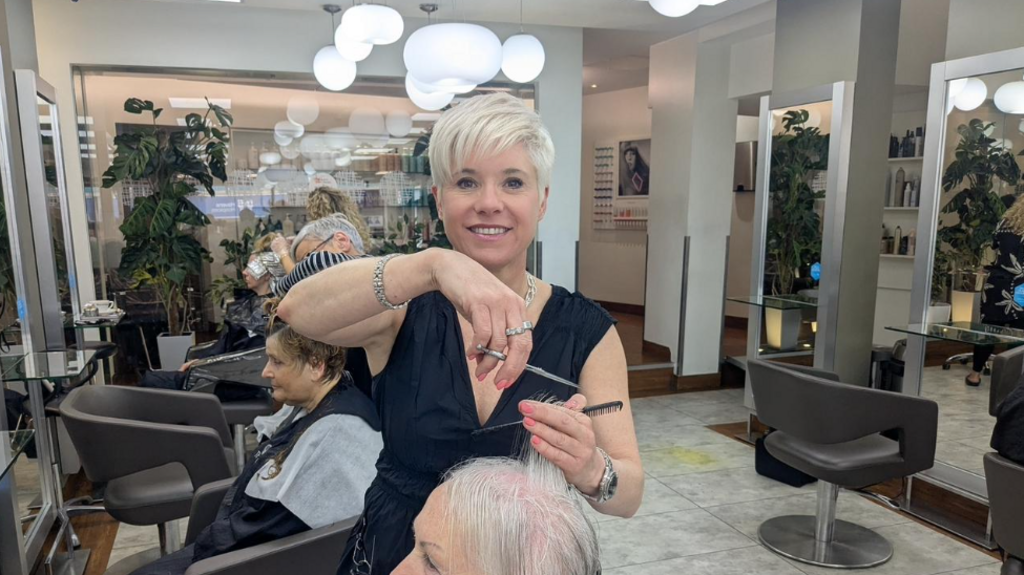“I never aspired to do anything other than hairdressing,” explained Kerry Larcher, who launched her first salon at age 21.
Having expanded her Hornchurch-based business in East London over more than 30 years, the 50-year-old now warns she could lose both her career and her home.
Larcher describes the tax rises unveiled in the October Budget as “crippling,” with an additional £23,000 in annual costs threatening to undo decades of work.
“Lately I’ve been crying myself to sleep; this has been the hardest time in my life since October,” she said.
“It’s shameful to find myself in debt, but we’re depleting our business reserves, and without profits I can’t draw wages.
“If the business collapses, I could lose my home. That’s the reality, and unless something shifts, it terrifies me.”
Government representatives maintain that Chancellor Rachel Reeves’ tax adjustments were necessary to stabilise the economy.
Officials highlight their business rates reform plans, scheduled for 2026–27, which are expected to deliver tax reductions for high street businesses, including salons.
However, many salon proprietors are concerned that reforms will come too late to prevent closures.
While tending to clients, Larcher noted she cannot afford to hire new apprentices this year, and has already reduced working hours for her 12 current trainees to a minimum.
She anticipates halving her apprentice team as contracts conclude, declining from 12 to six by year-end.
If business conditions fail to improve in the next four years, the jobs of her remaining 28 staff—primarily local women trained through her salon—are also at risk.
“Survival now means sharply cutting staff numbers,” she said.
“If reputable salons close, where will tomorrow’s hairdressers learn their craft?”
Larcher argues that the Chancellor’s approach, particularly affecting sectors heavily staffed by women, “completely contradicts the government’s stated aims” to foster economic growth and support the workforce.
She highlights that current UK VAT rules disadvantage labour-intensive sectors like hair and beauty, since VAT on staffing costs cannot be reclaimed, unlike VAT on goods.
“A café, for example, can claim VAT on food and drink and operate with one server for multiple tables within an hour,” Larcher said.
“In comparison, serving a single salon customer typically requires several staff and yet we can reclaim VAT only on the hair dye itself.”
Pandemic-related debts still burden many hairdressers, she noted, and further rises in employer National Insurance contributions and business rates are endangering salons’ viability nationwide.
For the Vanilla Rooms, Larcher’s Hornchurch salon, tax changes have added a “devastating” £23,000 per year due to the employer National Insurance threshold reduction to £5,000 and revised business rates.
National Insurance costs for her business have climbed 29%, from roughly £42,000 to £54,500—over £1,000 weekly—while business rates soared by 144%, from around £7,000 to approximately £18,000.
Larcher is among the 50,000 UK hair professionals represented by the British Hair Consortium (BHC), which is urging Rachel Reeves to intervene to prevent escalating costs from toppling the sector.
The BHC stresses that cutting VAT in half for salons—where wages account for 60% of expenses—would offer the most efficient relief.
According to the consortium, reducing VAT could actually raise total tax revenue by discouraging self-employment shifts and black market activity.
Larcher’s situation was among those cited by Conservative MP Julia Lopez, during a debate this week in Westminster Hall. She pressed Reeves to cut VAT from 20% to 10% for hair and beauty businesses.
Lopez, representing Hornchurch and Upminster, stressed that Larcher is not alone in contemplating complete closure.
“For some salons, the increased costs are simply untenable,” Lopez remarked, further noting that women bear the brunt of these changes.
“It’s difficult to overlook the irony of celebrating the first female Chancellor while targeting sectors predominantly employing and led by women.”
Sarah Gibson, business spokesperson for the Liberal Democrats, also criticised the Budget as “an unjust tax on jobs,” urging the government to introduce small business tax relief in June.
Gibson said more salons are now renting chairs to self-employed stylists instead of hiring directly, primarily to reduce tax liability.
“Without urgent support, chair renting will rise dramatically,” Gibson added, warning this could reduce overall Treasury revenue.
Defending Labour’s approach, Small Business Minister Gareth Thomas described the Chancellor’s October Budget measures as “crucial for long-term economic stability.”
Salons “are an essential part of our high streets,” he said, adding, “many hair and beauty businesses will benefit from additional measures announced by the Chancellor.”
“We have raised the employment allowance so that nearly one million employers pay no national insurance contributions whatsoever.
More than half of employers will see no negative effect, or may gain from the changes, including a significant proportion of hair and beauty businesses,” he assured Parliament.
Update 26 April 2025: This article was revised to correct the reported increase in Kerry’s business rates; she stated the rise was from around £7,000, not £700 as previously indicated.
Subscribe to our Politics Essential newsletter for in-depth analysis, nationwide perspectives, and key political moments delivered straight to your inbox every weekday.
Quangos are funded by taxpayers but operate independently from central government, and include regulatory bodies.
Anne Cole, co-owner of Klickers salon in Rugby, attributes her decision to close to climbing operating costs.
Fire services in England warn they will face challenges covering increased employer National Insurance costs.
Ministers have published summaries of their 2023/24 tax returns, including the Prime Minister and Chancellor.
The Treasury minister has defended proposals for a separate levy to fund healthcare spending.

